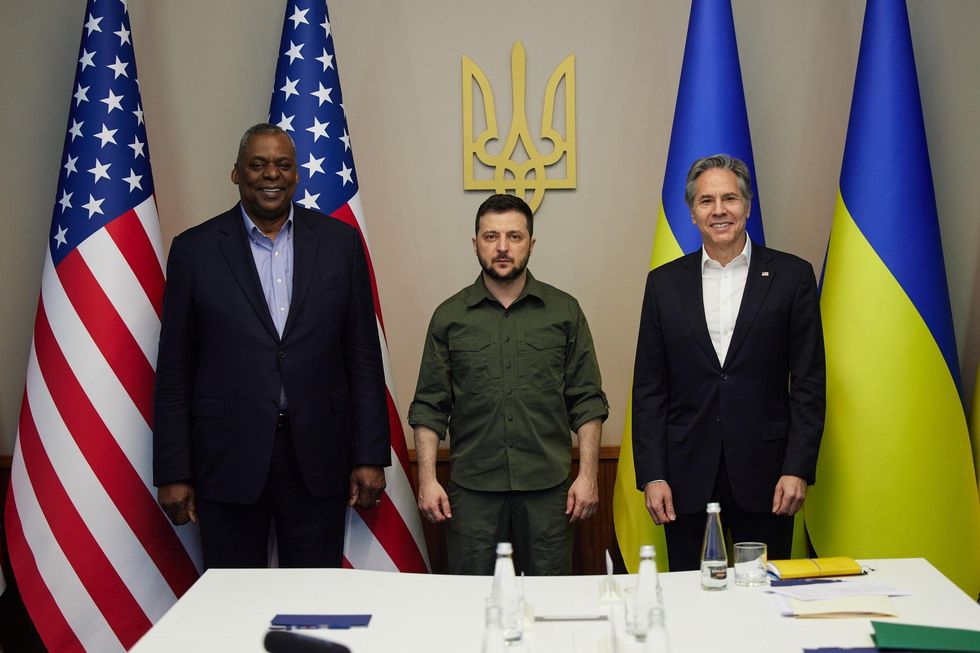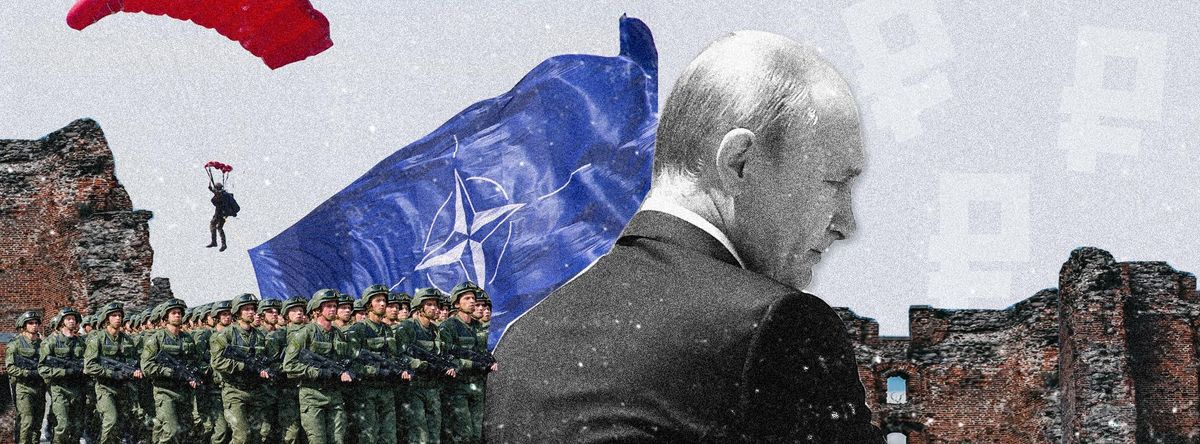“We want to see Russia weakened.” —Lloyd Austin, U.S. Secretary of Defense
“The war in Ukraine is our war.” —Liz Truss, UK Foreign Secretary
“We want to win this war.” —Ursula von der Leyen, European Commission President
You could be forgiven for thinking the United States and its European allies have declared open war on Russia.
There has been a shift in recent weeks, with Western leaders seemingly broadening their war aims from helping Ukraine defend itself to permanently crippling Russia. The stepped-up rhetoric stems from a growing belief that Russia must be hurt so much that Putin is irreversibly neutered, emboldened by 10 weeks of Russian military underperformance, Ukrainian overperformance, and universal disgust with the atrocities committed by Russian forces in Bucha and other towns they occupied.
 U.S. Defense Secretary Lloyd Austin (L) and Secretary of State Antony Blinken (R) meet with Ukrainian President Volodymyr Zelensky (C) in Kyiv on April 24.Ukrainian Presidential Press Office via Getty Images
U.S. Defense Secretary Lloyd Austin (L) and Secretary of State Antony Blinken (R) meet with Ukrainian President Volodymyr Zelensky (C) in Kyiv on April 24.Ukrainian Presidential Press Office via Getty Images
The West has followed up harsher words with stronger actions—ramping up sanctions (most recently, the European Union proposed a phased oil ban and the SWIFT de-listing of Russia’s largest bank, Sberbank), supplying Ukraine with ever-heavier and more offensive weaponry (including howitzers, tactical drones, anti-tank weapons, and anti-aircraft defense systems) and directly training Ukrainian troops on advanced NATO weapons systems, regularly sharing real-time intelligence (reportedly allowing Ukrainians to kill a dozen Russian generals and strike at targets inside Russia)—all intended to undercut Russia’s long-term military and economic power and help Ukraine kill more Russians.
Want to understand the world a little better? Subscribe to GZERO Daily by Ian Bremmer for free and get new posts delivered to your inbox every week.
The narrative in Russia has also escalated significantly, pivoting the conflict from a “special military operation” limited to protecting ethnic Russians in the Donbas to an all-out existential struggle between a besieged Russia and an evil West hell-bent on destroying it, where Ukraine is merely the battlefield and total victory is the only acceptable outcome.
Russian state media is in overdrive mode pushing the idea that Russia is under attack by the West, calling for strikes on NATO countries, and even glorifying nuclear annihilation. Kremlin officials have rattled their nuclear saber multiple times, and President Vladimir Putin himself has said that the U.S. and its allies are trying to “destroy Russia from within.” According to Russian Foreign Minister Sergey Lavrov, NATO’s actions are creating a “serious, real” risk of World War III, and Defense Minister Sergei Shoigu recently warned that Russian forces would consider targeting NATO weapons convoys in Ukraine.
Herein lies the danger of the West’s shift in tone. The goal cannot and should not be the destruction of Russia’s military, because that’s not going to happen without risking World War III.
Despite its many failures in Ukraine, Russia is still a nuclear superpower with a military 10 times larger than Ukraine’s and all sorts of advanced military capabilities to destabilize not just Ukraine but NATO countries. Many of these capabilities (e.g., cyber and anti-satellite weapons) haven’t been used against Ukraine, but Russia retains the ability to engage in asymmetric, highly destructive cyber, electronic, and information warfare against the much more conventionally powerful West.
Acting as if driving Russia off the map was possible, as many in the U.S. and Europe increasingly are calling for, is not only unrealistic but essentially demands Russian retaliation, and it gives Putin the foil he needs to turn a humiliating and morally ruinous self-inflicted defeat into a David-and-Goliath struggle for survival.
There’s a good chance that on May 9, when Putin makes his Victory Day speech commemorating the Soviet defeat of Hitler, he will officially recast the “special military operation” in Ukraine as a war against NATO and liken it to the war against Nazi Germany. There’s also speculation that he may order a general mobilization of the Russian people, including the conscription of up to 150,000 additional troops, to achieve a total win over Ukraine and NATO. (This strikes me and other analysts as less likely given how little it would achieve and how politically risky mass conscription would be for Putin.)
Such a broadening of Russia’s war aims would up the stakes for Putin personally and, accordingly, would be very dangerous for the world. The risk of strikes on supply lines inside NATO territory, cyberattacks, disinformation campaigns, further gas cutoffs, and the like would increase significantly. This is a far cry from World War III, but it’s still a world no one wants to be in.
To minimize these risks, the U.S. and its allies should make it clear that their aim is to get Ukraine back to the borders that existed before Russia’s February 24 invasion, and ideally before the Russian invasion in 2014. In other words, the West’s stated goal must be the withdrawal of all Russian troops from Ukraine, including the Donbas—not to weaken Russia for the sake of it.
Let me be clear: President Putin is responsible for all the harms that come to him and Russia. The United States and its allies didn’t just wake up one day and set out to weaken Russia in a proxy war. Putin chose to attack a sovereign, independent nation without provocation. Western countries are supporting Ukraine as it exercises its inalienable right to self-defense. Everything NATO has done has been a response to Putin’s war of choice. That said, the U.S. and its allies must be careful not to stumble into a broader war with Russia that they do not need and cannot afford.
Will Western restraint bring the Russia-Ukraine war any closer to an end? Probably not, at least as long as both sides can achieve further gains through military means. It’s hard to imagine that Putin will admit defeat in Ukraine and agree to a withdrawal, or that he can accept a Western-backed, independent Ukraine (a country he considers illegitimate) with military capabilities rivaling his own, led by international hero President Zelensky, in his backyard. And he’s not under any domestic pressure to do so: most Russians aren’t yet feeling the pinch of sanctions, they believe the lies they get bombarded with by state media, and accordingly they support Putin’s war as they understand it. It’s equally inconceivable that Zelensky can accept anything less than a return to Ukraine’s pre-2014 borders. Accordingly, the near-term prospects of a negotiated settlement or even a ceasefire are bleak.
In the meantime, the U.S. and its allies won’t (and shouldn’t) lift sanctions or relent in their support for Ukrainian efforts to expel Russian troops from Ukrainian territory. But their aims should go no further than that, and they should say so.
Make it clear that the West is at war with Russia’s actions in Ukraine, not with the Russian people. Force Putin to lose the war he started, instead of giving him the war he wants fight.
🔔 And if you haven't already, don't forget to subscribe to my free newsletter, GZERO Daily by Ian Bremmer, to get new posts delivered to your inbox.






